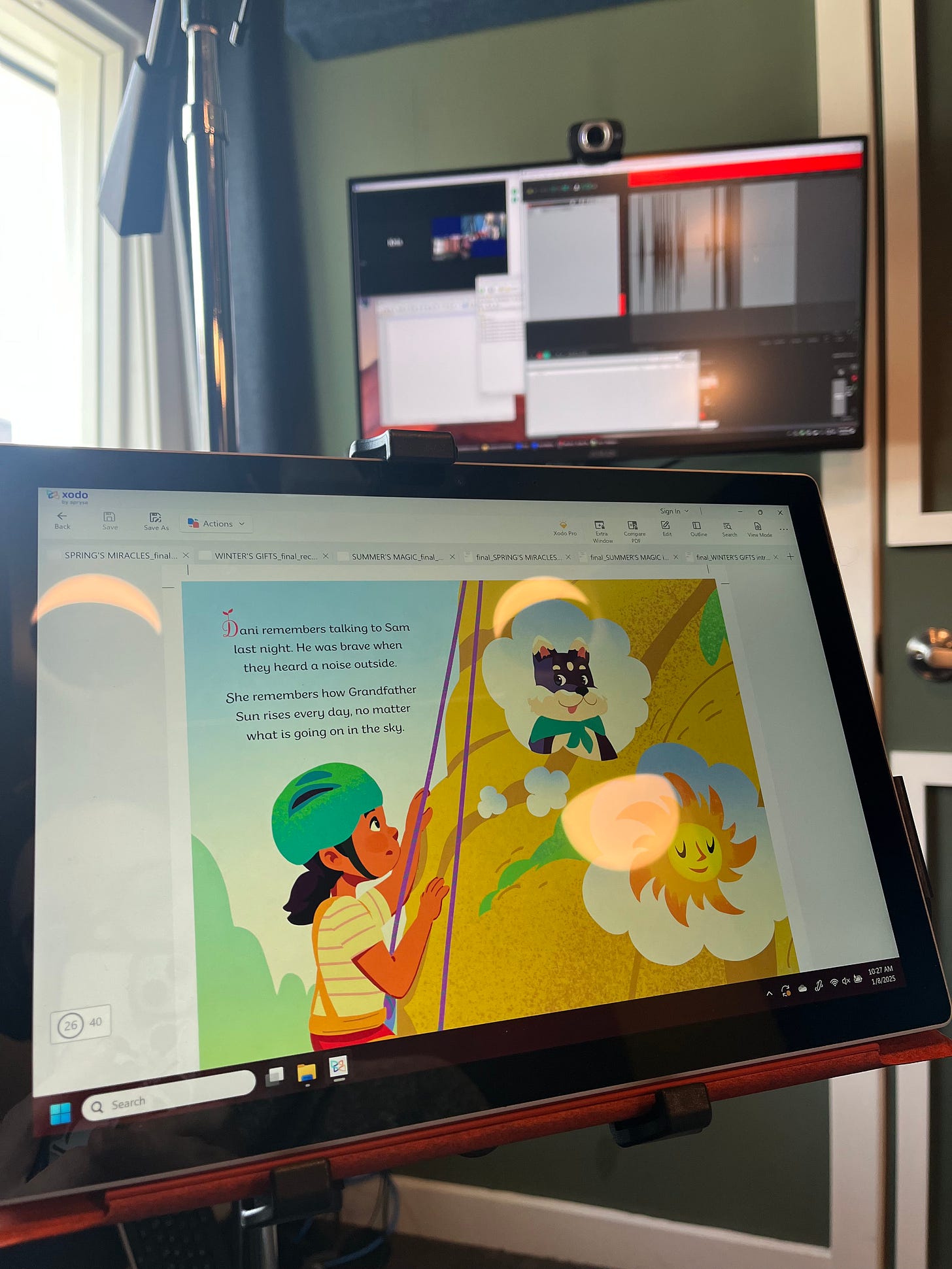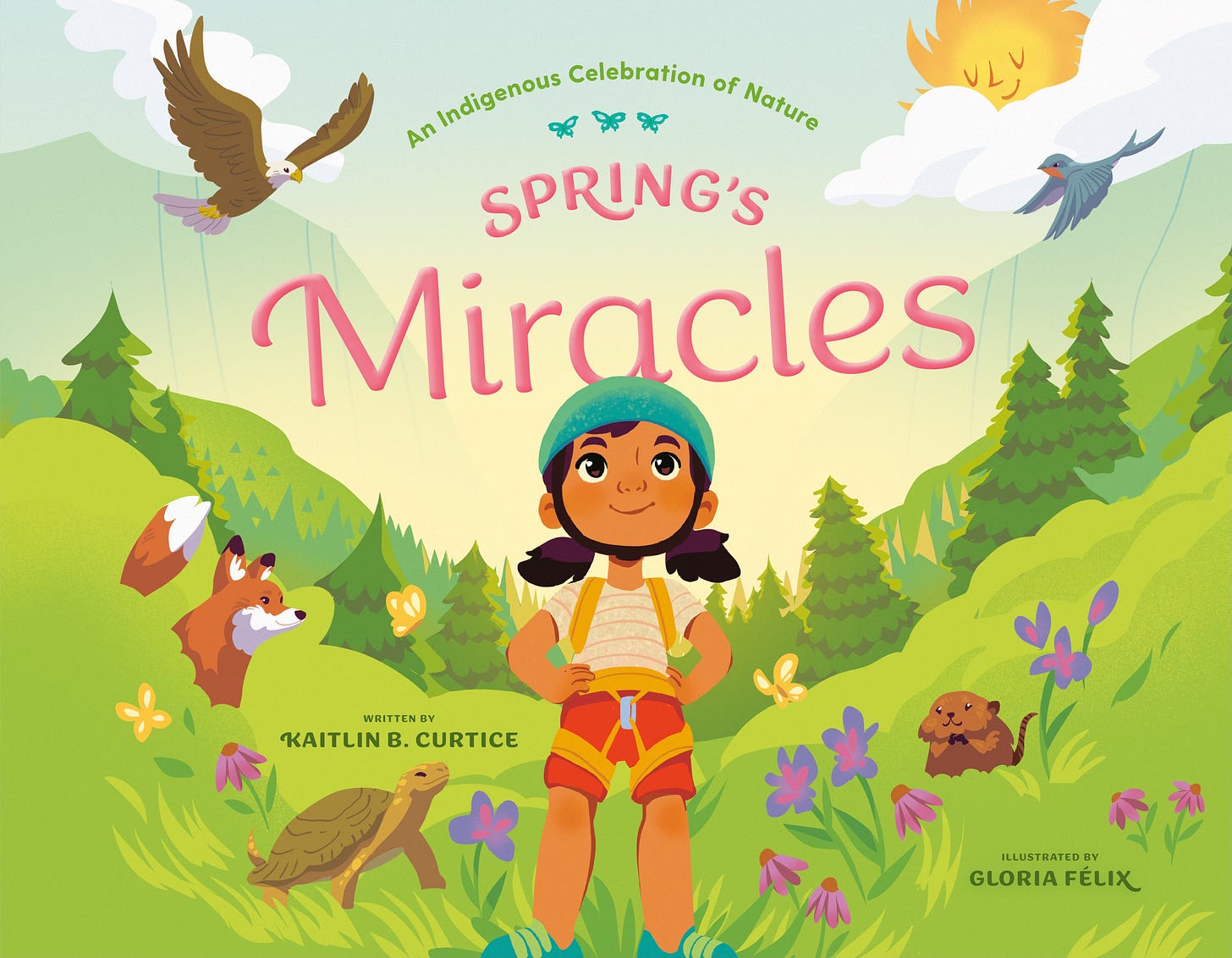This is a mutual aid spreadsheet for victims of the LA fires. Please find ways to help, whether through donations, reaching out to friends, helping folks find places to stay, or giving in another way. Click here to access the full spreadsheet.
Hello friends,
Above is a picture I took recently while in a recording studio to get the audio set up for my children’s book series, An Indigenous Celebration of Nature. They are going to be made into Wonderbooks (check it out here!) which will make my books accessible for kids to listen to the story as they read.
In a heavy world, I think about hope, and I find that even recording an audio book is a way of resisting the status quo, of seeking hope where it is difficult to find, of acknowledging that stories matter. In my new book, Spring’s Miracles, which is out in March (pre-order now!), Dani faces a moment of fear, of self-doubt, and she relies on the world around her to remember that she is brave, and that she is capable of hope, of reaching her dreams.
This is a powerful reminder for all of us in a world where we feel like we are always bracing for impact.
I was recently in the Asheville, North Carolina area, speaking at Montreat conference center for their annual college conference. The theme of the conference was Unimaginable Possibilities: God’s Hope for a Weary World. So you can imagine the weight that I carried into this space, a weight of wanting to bring something that could heal and speak some sort of comfort and care into people trying to figure out how to navigate this world.
So I want to share just a few things with you from this talk, because we all need some hope right now, but not just hope, a way to hold hope, to imagine.
To begin the talk, I said:
To lack imagination is truly one of the most dangerous things in the world. As Potawatomi people, as Indigenous peoples across the world and throughout time, our ancestors imagined us—imagined future generations, and that is what propelled them forward, what kept them surviving.
I think about ancestors all the time lately, my ancestors, our ancestors, all those who came before us, those trying to navigate a complex world that is always, always changing. Always, we’ve been faced with hopelessness, with unimaginable possibilities.
…what kind of world have we inherited? What have we imagined, seen, known so far? The world is hurting. People are dying. There is war, oppression, natural disasters, people losing those they love, governments and corporations choosing deliberately not to care for the poor or those they deem “other” in their societies. We know what is possible in this world.
But we also see people stepping up to care for one another. We see intergenerational healing happening, we see decolonization, people choosing a better way to live in community. We see people healing their relationship to Mother Earth, caring for each other in crisis. We see hope, too.
So, we imagine (and embody) hope by investing in kinship, care, and community.
First, kinship:
I want to explore this through some of the things I wrote about kinship in my book Native. The premise of Native follows Original Man and the animals, who rebuild the world after it is completely flooded. But I don’t want to talk about the flood itself; I want to talk about how Original Man and the animals came together as kin to dream a new world into being, using their imaginations to build what felt impossible to them.
They were still grieving a changed world, but they kept dreaming through their grief.
It is important here to name for us that having hope is not denying grief. We move through our grief toward hope, both of them exist together, so very often in our lives.
Richard Rohr writes in Just This, “Hope is a learned capacity to suffer wisely, calmly, and generously.”
So, somehow, hope is mingled with grief, suffering, pain, joy, wisdom. How is it that we are so beautifully, terribly complex? We hold it all. Our imaginations allow us to. So what are you imagining?

Second, we imagine care, individual and collective care, because both matter, and our entire life is a dance between the two.
So whether it’s learning to care for ourselves or for others in relationship, I want to remind us that it isn’t always going to be perfectly balanced. With everything going on in your life, you don’t have to have it all perfectly balanced. Remembering that this is a dance, a form of movement, is an important tool to help us reimagine a better world.
I spend my mornings journaling and praying, and I haven’t always done this. It took me a lot of years feeling guilty for not doing it, and now, in my late 30s, I am coming back to this thing in my life that helps me care for my own soul. And as I do, it helps me show up to a world that is unknown, scary, waiting for someone to write another poem or tell a story.
One of my all-time favorite singers is Irish singer-songwriter Glen Hansard, who writes and sings with a passion and deep medicine that always moves me. I was thinking about his song “There’s No Mountain” from his newest album, and thought I’d share it here, because it’s about hope, about showing up with and for one another and for ourselves, and acknowledging the difficulty ahead of us and choosing to show up anyway.
You can watch/listen here:
Third, we imagine hope through community and the power of story.
From my upcoming book Everything is a Story:
The stories we tell about one another can be incredibly powerful. Eventually, they can outrun us before we’re able to stop them. To illustrate this point, think of one of the most insidious aspects of high school: the rumor mill.
Someone starts a rumor about another person, specifically to embarrass them or harm their reputation. Perhaps it’s harmless enough, although the era of social media makes these dynamics far more accessible and disastrous for those targeted.
The rumor begins to spread, first to core groups of people, then to the school, then the community. Families find out, pastors, folks at the local diner are heard talking about it over their breakfasts. Before anyone can stop it, the story has outrun the original teller, the creator—expanding and affecting more and more people as it grows.
This may be a dramatic example, but it’s happened countless times. We watch television shows and movies about it, read books based on real moments just like this. Some people outlive the rumors told about them, and some don’t.
It matters how we tell stories about one another.
How do we hold one another in community, tell stories that give future generations the power of hope and imagination? How do we hold stories for ourselves?
And can we remember that our ancestors and future generations are also our community? That changes how we show up in the world, too.

So—kinship, care, community—is how we show up in the world, in our communities. We get to choose what that looks like. And I have a lot of hope for us, that we will show up for one another, that we are, that future generations will feel the love we pour out in our times of greatest need, in unimaginable times.
I want to share this poem with you, one I recently wrote on hope, as we wrap this up.
How do we find hope
In terrifying times?
Usually, we don’t—
Hope finds us,
In the child playing
In the autumned woods,
In the perfectly fusiform
Acorn that lands at our feet,
In the neighbor who just lost
Someone they love,
In the unexpected friendship
That shows up at our doorstep,
In the tender snore of a
Weimaraner’s afternoon nap
And in the tears we cry when we
Don’t know what to pray for anymore.
There, Hope found you, and you
Didn’t even have to open the glovebox
To go looking for that old, weathered map.
Onward, friends, toward imagination, toward hope, toward what we cannot yet see but choose to believe.




Thank you for your words. I've been thinking about the power of imagination a lot lately. I appreciate this so much!
Hope found me today through your soothing words, dear Kaitlin. You never cease to be my North Star when the path ahead looks bleak.